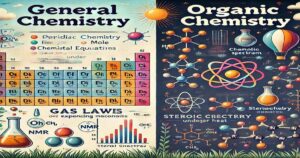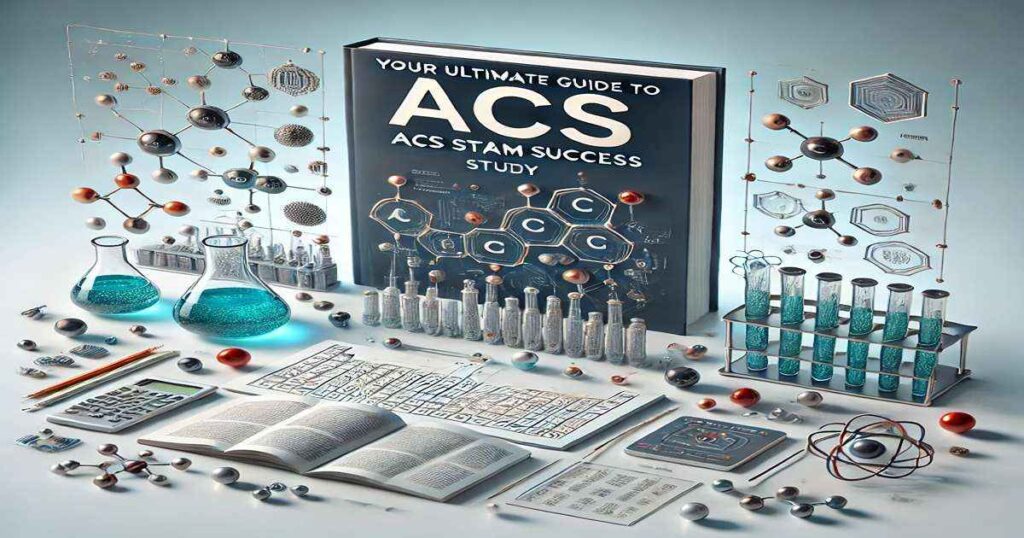Global Insight Portal
Rating Breakdown:
- Overall: 4.5/5.0
- Content Quality: 5.0/5.0
- Rating: 4.5/5.0
Review:
blog post is a comprehensive guide to the ACS Study Guide, detailing its features, benefits, and practical study strategies. It highlights the guide’s alignment with ACS exam formats, helping students focus on key topics and practice effectively. With tips on time management, concept mastery, and additional resources, the post serves as a valuable roadmap for exam success.
What is the ACS Study Guide, and why is it important?

Answer:
The ACS Study Guide is a comprehensive resource designed to help students prepare for the American Chemical Society (ACS) standardized exams. It covers key topics in chemistry, including general, organic, and analytical chemistry, offering practice questions and explanations. This guide is essential for students aiming to excel in the ACS exams, as it provides focused content aligned with the exam format and reinforces fundamental concepts.
Introduction: Your Ultimate Guide to ACS Exam Success

Are you gearing up for your ACS General Chemistry or Organic Chemistry exam and wondering where to start? The ACS Study Guide is more than just a book—it’s your roadmap to mastering concepts, acing practice questions, and building confidence for exam day. Whether you’re a seasoned student or just starting your preparation journey, this guide has been a trusted companion for countless learners.
In this post, we’ll delve into why the ACS Study Guide is an essential tool, how it simplifies complex topics, and the best strategies to maximize its potential. By the end, you’ll understand how this resource can be a game-changer for your success.
Stay with us as we unpack everything you need to know about the ACS Study Guide. Let’s turn your chemistry challenges into achievements!
What is the ACS Study Guide?

The ACS Study Guide is a well-structured resource specifically designed for students preparing for the American Chemical Society (ACS) exams in General and Organic Chemistry. This guide isn’t just another textbook—it’s a comprehensive tool crafted to align with the ACS exam format and syllabus, ensuring that students focus on the most relevant topics.
Key Features of the ACS Study Guide
- 1. Detailed Coverage: Covers all major concepts in General and Organic Chemistry.
- 2. Practice Questions: Includes exam-style questions with detailed solutions.
- 3. Exam Strategies: Offers tips to navigate the exam efficiently.
- 4. ACS-aligned Content: Perfectly tailored to the ACS curriculum.
Why is the ACS Study Guide Essential?
1. Helps You Master Exam Concepts
The ACS exams test your understanding of fundamental chemistry concepts. The guide simplifies complex topics, making it easier for you to grasp essential principles and apply them effectively.
2. Prepares You for the Exam Structure
The ACS Study Guide mirrors the format of the ACS exams. By practicing with this resource, you’ll become familiar with question patterns, time management, and the overall structure, which can significantly reduce exam-day anxiety.
3. Builds Confidence Through Practice
With hundreds of practice questions, the guide gives you ample opportunity to test your knowledge. Each question comes with detailed solutions, helping you identify and correct mistakes while building confidence.
4. Saves Time with Targeted Preparation
Instead of wasting time on unnecessary topics, the ACS Study Guide helps you focus on high-priority areas. This targeted approach is especially useful for students juggling multiple responsibilities.
How to Use the ACS Study Guide Effectively
Step 1: Understand the Syllabus
Start by reviewing the ACS syllabus. Use the guide to align your study sessions with the topics outlined in the syllabus.
Step 2: Master One Topic at a Time
Focus on one section before moving to the next. Take notes, highlight key points, and solve practice questions related to each topic.
Step 3: Simulate Exam Conditions
Use the guide to attempt full-length practice tests under timed conditions. This will help you get accustomed to the pressure of the real exam.
Step 4: Review and Revise
Regularly revisit sections where you face difficulties. The guide’s detailed explanations will help you clear up any lingering doubts.
Things to Know About the ACS Study Guide
It’s suitable for both General Chemistry and Organic Chemistry exams.
Provides a structured approach for first-time test takers and repeat examinees.
Endorsed by educators for its reliability and relevance.
See Results with the ACS Study Guide
Students who incorporate the ACS Study Guide into their preparation often report better scores and increased confidence. Its user-friendly design and exam-focused content make it an indispensable tool for success.
Why Do You Need the ACS Study Guide?
When preparing for the ACS (American Chemical Society) exam, the ACS Study Guide is an invaluable resource that can make a significant difference in your performance. But why is it so essential? Let’s explore its benefits in detail.
How the ACS Study Guide Supports Exam Preparation

Understand the Question Patterns
The ACS Study Guide provides insights into the types of questions commonly asked in the exam. By reviewing past questions and patterns, students can better anticipate what to expect. This familiarity can reduce anxiety and improve confidence on exam day.
Simplifies Key Concepts
One of the most critical aspects of studying for the ACS exam is mastering core topics. The guide breaks down complex concepts into simpler, digestible sections, making it easier to retain and apply the knowledge during the test.
Benefits of the ACS Study Guide for Students

Improved Exam Performance
Studies have shown that students who use the ACS Study Guide often achieve higher scores. This is because the guide is meticulously designed to align with the actual exam format, covering the most relevant topics and question styles.
Example:
“Students who use the ACS Study Guide often score higher, as it aligns closely with the actual exam format.”
Saves Study Time
Instead of sifting through multiple resources, the ACS Study Guide provides a focused, well-organized approach. It highlights chapter-wise key points and includes practice questions to test your knowledge.
Builds Confidence
With targeted preparation, students feel more confident and less overwhelmed. The ACS Study Guide acts as a roadmap, guiding them through the essential topics without unnecessary distractions.
How to Use the ACS Study Guide Effectively

- 1. Set a Schedule: Dedicate specific time slots to review different chapters.
- 2. Practice Regularly: Use the practice questions to test your understanding.
- 3. Focus on Weak Areas: Identify topics where you struggle and spend extra time mastering them.
- 4. Review Frequently: Regular revisions ensure you retain information for longer.
Related Searches You Might Find Useful:
How to score high on the ACS exam
Tips for effective ACS exam preparation
Best resources for ACS chemistry review
By incorporating the ACS Study Guide into your preparation strategy, you’ll be well-equipped to tackle the exam with confidence and success.
Things to Know About the ACS Study Guide
Tailored to the ACS exam format.
Includes chapter-wise breakdowns for focused learning.
Contains practice questions to reinforce concepts.
The ACS Study Guide isn’t just a book—it’s a proven tool that can transform your exam preparation. Use it wisely, and you’ll see the results for yourself.
ACS Study Guide: General Chemistry vs. Organic Chemistry

When preparing for the American Chemical Society (ACS) exam, understanding the key differences between General Chemistry and Organic Chemistry is crucial. Each section demands a unique approach and focus. Let’s explore what you need to know to ace your ACS exams effectively.
General Chemistry
Key Topics Covered
The ACS Study Guide for General Chemistry typically covers foundational concepts essential for understanding chemistry. Some of the primary topics include:
Stoichiometry: Mastering mole calculations, limiting reagents, and balancing equations.
Thermochemistry: Understanding energy changes, enthalpy, and calorimetry.
Atomic Structure and Periodicity: Examining electron configurations and periodic trends.
Chemical Bonding: Focusing on ionic, covalent, and metallic bonds.
Most Important Chapters
While all chapters are important, certain topics are frequently emphasized in exams:
Equilibrium: Acid-base reactions, solubility, and Le Chatelier’s Principle.
Kinetics: Rate laws and reaction mechanisms.
Gas Laws: Boyle’s, Charles’s, and the Ideal Gas Law.
Study Tips
- 1. Prioritize problem-solving. Practice with past ACS questions.
- 2. Focus on understanding concepts rather than memorization.
- 3. Create summary notes for complex topics like equilibrium.
Organic Chemistry
Key Topics Covered
The ACS Study Guide for Organic Chemistry requires a detailed understanding of reactions and mechanisms. Major topics include:
Reaction Mechanisms: Electrophilic addition, nucleophilic substitution, and elimination reactions.
Spectroscopy: Infrared (IR), Nuclear Magnetic Resonance (NMR), and Mass Spectrometry (MS).
Stereochemistry: Chiral centers and enantiomers.
Most Important Chapters
Organic Chemistry emphasizes understanding over memorization. Critical chapters include:
Aromatic Compounds: Electrophilic aromatic substitution reactions.
Carbonyl Chemistry: Aldehydes, ketones, and carboxylic acids.
Polymers: Formation and uses in everyday life.
Study Tips
- 1. Practice reaction mechanisms step-by-step to understand electron movement.
- 2. Familiarize yourself with IR and NMR patterns for identifying functional groups.
- 3. Use flashcards for functional groups and reaction names.
ACS Exam Preparation: Key Takeaways
- 1. Use the ACS Study Guide Effectively: It is a well-structured resource with practice questions aligned with exam patterns.
- 2. Balance Time Between Topics: Allocate study time based on personal strengths and weaknesses.
- 3. Take Practice Tests: These simulate real exam conditions and highlight areas needing improvement.
By breaking down topics and focusing on essential concepts, you’ll enhance your understanding and performance. Remember, consistent practice and a strategic approach are the keys to success in both General and Organic Chemistry.
How to Use the ACS Study Guide Effectively
Preparing for the ACS exam can be challenging, but with the right strategy, you can achieve excellent results. This guide will show you how to make the most of your ACS Study Guide, focusing on structured techniques and practical tips.
Why the ACS Study Guide is Essential
The ACS Study Guide is a comprehensive resource designed to help students understand key chemistry concepts. It offers a wide range of practice questions, summaries, and detailed explanations that align with ACS exam standards.
1. Create a Study Schedule
Allocate Daily Study Time
Consistency is key. Dedicate at least 30 minutes daily to revising concepts and solving problems from the guide. This ensures steady progress and prevents last-minute cramming.
Example:
Morning: Review concepts for 15 minutes.
Evening: Take a short practice test or solve problems for another 15 minutes.
Break Down Topics by Chapters
Divide the chapters into manageable sections. Focus on one or two chapters daily to ensure thorough understanding.
2. Understand Key Concepts
The ACS Study Guide emphasizes foundational topics like thermodynamics, organic reactions, and chemical equilibrium. Don’t just memorize – focus on understanding how these concepts connect.
Tips for Better Understanding:
Summarize each chapter in your own words.
Use diagrams and flowcharts to visualize complex ideas.
3. Practice, Practice, Practice
Importance of Practice Tests
Practice tests simulate the real exam environment, helping you identify strengths and weaknesses. They also familiarize you with the exam format.
Take one official ACS practice test weekly.
Use third-party resources to explore additional question types.
Access Official ACS Practice Tests Here
4. Analyze Your Mistakes
Review incorrect answers carefully. Understand why you made mistakes and revisit the corresponding chapters in the guide.
5. Use Supplementary Resources
While the ACS Study Guide is your primary tool, consider supplementing your study with:
Chemistry textbooks for in-depth explanations.
Online video tutorials for visual learning.
Related Searches to Enhance Learning
“Best tips for ACS exam preparation”
“ACS practice test questions and answers”
“How to master chemistry concepts quickly”
By following these steps, you can maximize the benefits of the ACS Study Guide and excel in your exam. Focus on consistency, practice, and understanding to build a strong foundation.
Ultimate ACS Study Guide: Everything You Need to Know

The ACS (American Chemical Society) Study Guide is an essential resource for chemistry students preparing for their exams. In this comprehensive post, you’ll find insights, tips, and free resources to help you excel. Whether you’re starting from scratch or revisiting concepts, this guide has you covered.
Things to Know About the ACS Study Guide
The ACS Study Guide is specifically designed to help students master topics in general, organic, and physical chemistry. Here’s what you should know:
Structured Content: Topics are divided into logical sections for easier understanding.
Practice Tests: Gain confidence with exam-style questions.
Problem-Solving Strategies: Learn effective approaches to tackle complex problems.
See Results With the Right ACS Study Guide
Choosing the right ACS Study Guide can significantly impact your preparation. Look for guides that offer:
Clear explanations with solved examples.
Access to online practice tests.
Interactive features like flashcards.
Top Study Tips for ACS Success
1. Utilize Free Resources
You don’t always need to spend a fortune on study materials. Here’s how to find valuable free resources:
Download free ACS Study Guide PDFs from reliable sources.
Explore YouTube channels offering video tutorials on ACS exam topics.
Join online forums for access to shared notes and discussions.
2. Focus on Group Study
Studying with peers can be highly beneficial. Share notes, clarify doubts, and test each other on challenging topics.
3. Create Effective Notes
Highlight key points in the ACS Study Guide, summarize concepts, and create flashcards for quick revision.
4. Practice Regularly
Dedicate time daily to solving practice questions. This not only reinforces concepts but also builds speed and accuracy.
Related Search Queries
Students searching for ACS study resources often look for:
“Free ACS Study Guide PDFs”
“Best study tips for ACS exam”
“ACS exam practice questions”
“ACS general chemistry tips”
Conclusion
The ACS Study Guide is more than just a study tool; it’s your ultimate companion for mastering chemistry concepts and excelling in the ACS exam. Its structured content, practice-focused approach, and targeted strategies make it an essential resource for every aspiring chemistry student.
With proper utilization of the guide, regular practice, and a commitment to consistent effort, achieving your dream score is not only possible but highly attainable.
Start your journey today with the ACS Study Guide and move one step closer to success in your ACS exam!

